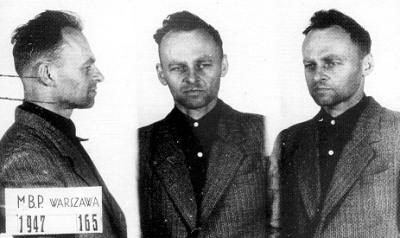Poles looking for lost remains of hero of World War II resistance
Witold Pilecki is pictured in Mokotow prison after his arrest by the Communists in 1947. (Photo by an Unknown photographer, via Wikimedia Commons.)
In Warsaw, Poland, there’s a cemetery where many of the country’s most famous poets and thinkers are buried.
The grounds are covered with marble monuments. But in one corner there’s an unmarked grave.
And right now, an exhumation is under way in that corner.
There lie the remains of about 100 people executed by the communists who took power in Poland after World War II.
One of those buried there is believed to be Witold Pilecki. He’s not well known in the United States, but he’s a hero in Poland.
He fought the Nazi invasion in 1939, then helped to form the underground resistance.
“But he’s a hero because he volunteered to go to Auschwitz,” said Michael Schudrich, chief rabbi of Poland. “He went to find out what was happening and tell the world.”
Pilecki built a radio in the camp to send reports back to his resistance colleagues in Warsaw.
Those reports helped the Polish government-in-exile tell the world what was happening at Auschwitz.
In 1943, Pilecki escaped and fought with the Polish resistance during the Warsaw uprising against the Germans.
He was captured and tortured by the Nazis, but survived.
After the war he returned to Poland and again stood up to totalitarianism, documenting the atrocities of the Communists. That got Pilecki arrested and tortured again, this time by fellow Poles.
He was shot in 1948, after a very public show trial.
Since the fall of Communism in Poland, Pilecki has received several posthumous honors from the Polish government.
“But he is even more of a hero to the Jewish people of Poland,” Schudrich said.
